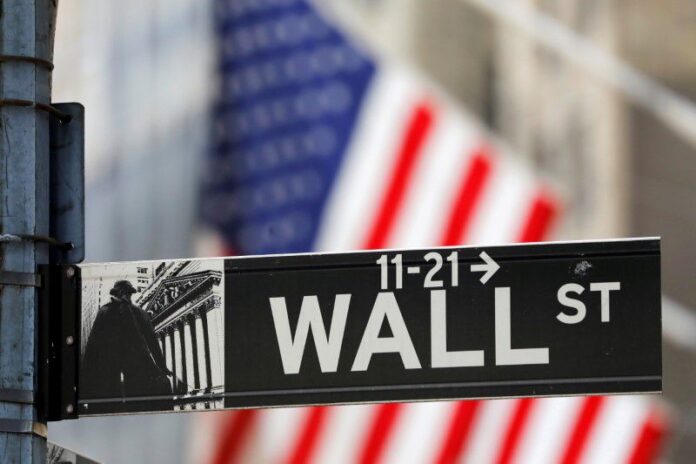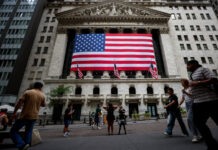
The surge in stocks that followed the Federal Reserve decision proved short lived as concern over persistently high inflation and an economic recession resurfaced.
More than 90% of the companies in the S&P 500 retreated on Thursday, with the benchmark halting a three-day rally. The technology-heavy Nasdaq 100 underperformed major equity gauges, tumbling 4%. The dollar also made an about-face, climbing alongside Treasury 10-year yields — which topped 3%. The pound slumped as investors looked past the Bank of England’s rate increase and turned their focus on forecasts for a recession in 2023. Oil advanced.
Mortgage rates in the U.S. resumed their upward climb — reaching the highest level since August 2009. The average for a 30-year loan jumped to 5.27% from 5.10% last week, Freddie Mac said in a statement Thursday.
By pushing back on a jumbo-hike of 75 basis points in June, Fed Chair Jerome Powell beat back the market’s most-aggressive predictions for the path of interest rates on Wednesday. However, he may also have inadvertently set the stage for more turbulence going forward. It’s still a very rocky road ahead, with pivotal economic data and global developments due within days that could seed doubts about the central bank’s approach.
Comments:
- “We were surprised that he seemed to rule out a 75 bp hike as we believe the Fed should always keep all options open,” wrote Win Thin, global head of currency strategy at Brown Brothers Harriman, referring to Powell. “Make no mistake, the Fed is in the early stages of what we believe will be a very aggressive tightening cycle.”
- “There was nothing dovish about the message from the FOMC,” wrote Michael Shaoul, chief executive officer at Marketfield Asset Management, referring to the Federal Open Market Committee. “Even so, the delivery of the certainty of a 50 bp hike acted as a catalyst for a violent unwinding of crowded positions.”
- “As Powell noted in his news conference, the war in Ukraine and Covid-related lockdowns in China represent additional supply-side shocks that are adding to inflationary pressure, making the Fed’s job of getting inflation down that much more difficult. However, in line with Powell’s view, we still believe there is a path to a soft landing,” wrote Mark Haefele, chief investment officer at UBS Global Wealth Management.
U.S. productivity dropped in the first quarter by the most since 1947 as the economy shrank, while labor costs surged and illustrated an extremely tight job market. Separate figures showed applications for state unemployment benefits climbed to 200,000 last week from 181,000. The data precede the government’s monthly jobs report on Friday, which is currently forecast to show payrolls increased by 380,000 in April.
Corporate highlights:
- Elon Musk has secured about $7.1 billion of new financing commitments, including from billionaire Larry Ellison, a Saudi Prince, and Sequoia Capital, to help fund his proposed $44 billion takeover of Twitter Inc.
- Verizon Communications Inc. is considering raising prices for wireless service — one of several possible options to pass along inflation-related costs to consumers following AT&T Inc.’s decision this week to increaserates on older calling plans by $6 or more.
- Kellogg Co.’s first-quarter sales exceeded Wall Street estimates as global demand for snacks offset inflationary pressures.
- Shopify Inc. missed analysts’ profit estimates and announced the largest acquisition in its history, a $2.1 billion deal for delivery startup Deliverr Inc.
Key events this week:
- U.S. April jobs report, Friday
Some of the main moves in markets:
Stocks
- The S&P 500 fell 2.6% as of 10:33 a.m. New York time
- The Nasdaq 100 fell 4%
- The Dow Jones Industrial Average fell 2%
- The Stoxx Europe 600 fell 0.2%
- The MSCI World index fell 1.8%
Currencies
- The Bloomberg Dollar Spot Index rose 0.8%
- The euro fell 0.6% to $1.0554
- The British pound fell 2% to $1.2377
- The Japanese yen fell 0.9% to 130.20 per dollar
Bonds
- The yield on 10-year Treasuries advanced 11 basis points to 3.04%
- Germany’s 10-year yield advanced five basis points to 1.02%
- Britain’s 10-year yield declined three basis points to 1.93%
Commodities
- West Texas Intermediate crude rose 1.4% to $109.28 a barrel
- Gold futures rose 1% to $1,888 an ounce






















